常用的翻译技巧
翻译常用的八种技巧
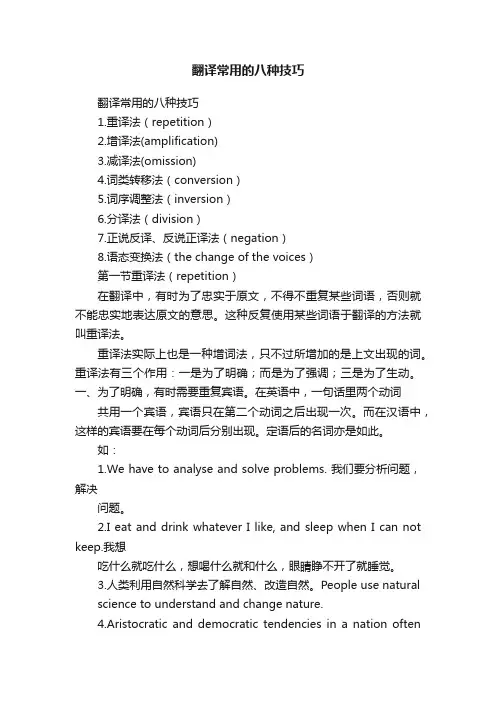
翻译常用的八种技巧翻译常用的八种技巧1.重译法(repetition)2.增译法(amplification)3.减译法(omission)4.词类转移法(conversion)5.词序调整法(inversion)6.分译法(division)7.正说反译、反说正译法(negation)8.语态变换法(the change of the voices)第一节重译法(repetition)在翻译中,有时为了忠实于原文,不得不重复某些词语,否则就不能忠实地表达原文的意思。
这种反复使用某些词语于翻译的方法就叫重译法。
重译法实际上也是一种增词法,只不过所增加的是上文出现的词。
重译法有三个作用:一是为了明确;而是为了强调;三是为了生动。
一、为了明确,有时需要重复宾语。
在英语中,一句话里两个动词共用一个宾语,宾语只在第二个动词之后出现一次。
而在汉语中,这样的宾语要在每个动词后分别出现。
定语后的名词亦是如此。
如:1.We have to analyse and solve problems. 我们要分析问题,解决问题。
2.I eat and drink whatever I like, and sleep when I can not keep.我想吃什么就吃什么,想喝什么就和什么,眼睛睁不开了就睡觉。
3.人类利用自然科学去了解自然、改造自然。
People use naturalscience to understand and change nature.4.Aristocratic and democratic tendencies in a nation oftenshowthemselves in its speech.民族的贵族倾向和民族倾向常在其言语中表现出来。
5.我们来修改安全规则和卫生规则吧。
Let’s revise our safety andsanitary regulations.二、英语常用省略,但为了明确,也为了强调某些内容,在汉语中常常要将省去的部分重译出来。
汉译英的几种翻译技巧
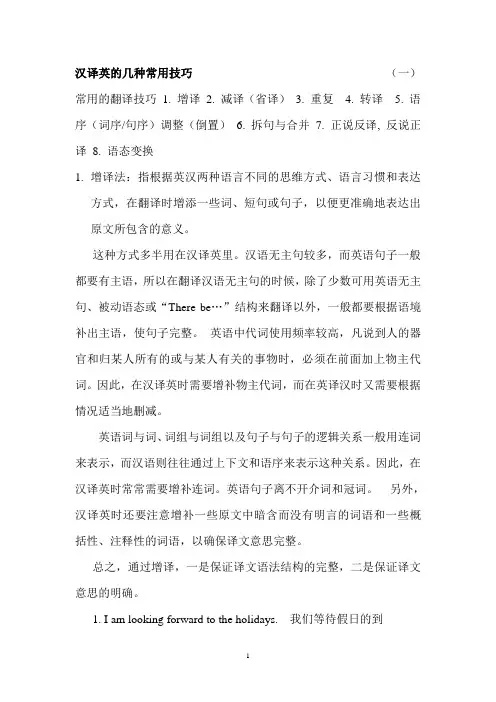
汉译英的几种常用技巧(一)常用的翻译技巧1. 增译2. 减译(省译)3. 重复 4. 转译 5. 语序(词序/句序)调整(倒置) 6. 拆句与合并7. 正说反译, 反说正译8. 语态变换1.增译法:指根据英汉两种语言不同的思维方式、语言习惯和表达方式,在翻译时增添一些词、短句或句子,以便更准确地表达出原文所包含的意义。
这种方式多半用在汉译英里。
汉语无主句较多,而英语句子一般都要有主语,所以在翻译汉语无主句的时候,除了少数可用英语无主句、被动语态或“There be…”结构来翻译以外,一般都要根据语境补出主语,使句子完整。
英语中代词使用频率较高,凡说到人的器官和归某人所有的或与某人有关的事物时,必须在前面加上物主代词。
因此,在汉译英时需要增补物主代词,而在英译汉时又需要根据情况适当地删减。
英语词与词、词组与词组以及句子与句子的逻辑关系一般用连词来表示,而汉语则往往通过上下文和语序来表示这种关系。
因此,在汉译英时常常需要增补连词。
英语句子离不开介词和冠词。
另外,汉译英时还要注意增补一些原文中暗含而没有明言的词语和一些概括性、注释性的词语,以确保译文意思完整。
总之,通过增译,一是保证译文语法结构的完整,二是保证译文意思的明确。
1. I am looking forward to the holidays. 我们等待假日的到2.Much of our morality is customary. 我们大部分的道德观念都有习惯性。
3.Reading makes a full man; conference a ready man; and writing an exact man.读书使人充实,讨论使人机智,笔记使人精确。
4.Histories make men wise; poets witty; the mathematics subtle; natural philosophy deep; moral grave; logic and rhetoric able to contend. 读史使人明智,读诗使人灵秀,数学使人周密,科学使人深刻,伦理使人庄重,逻辑修辞之学使人善辩。
汉译英翻译十大技巧
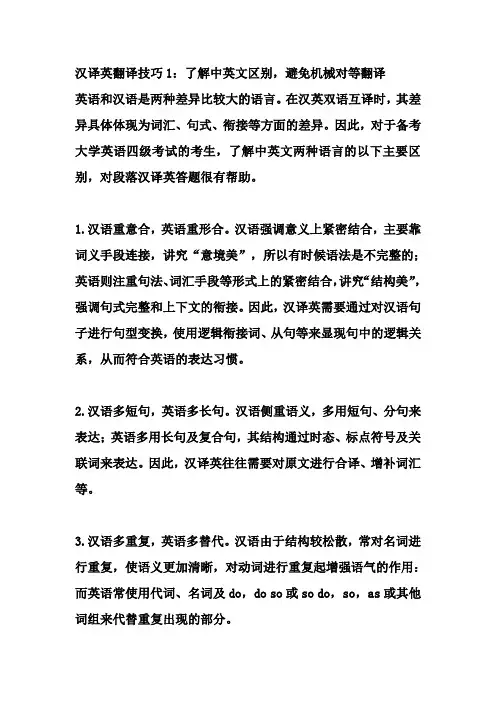
译文: A good chef is always trying to seek balance among cereal, meat and vegetable.
解析:仔细分析发现,句中有两个动词,分别是“努力”和“取得”,而“取得”是“努力”的目的,故把“努力”处理为谓语动词,“取得…”作目的状语。整句的主干为“厨师努力去取得”,译作…chef is trying to seek
2.汉语多短句,英语多长句。汉语侧重语义,多用短句、分句来表达;英语多用长句及复合句,其结构通过时态、标点符号及关联词来表达。因此,汉译英往往需要对原文进行合译、增补词汇等。
3.汉语多重复,英语多替代。汉语由于结构较松散,常对名词进行重复,使语义更加清晰,对动词进行重复起增强语气的作用:而英语常使用代词、名词及do,do so或so do,so,as或其他词组来代替重复出现的部分。
3.用解释的方式。中文的习惯用语和四字成语是令大家头痛的难点,汉译英时,可分两步走:先用浅显易懂的中文对其进行解释,然后再将其转化为英文。
4.根据上下文中的某个表达翻译某些难译的词。四级考试所考查的段落翻译是就某个话题展开的,所以有时可以借用上下文一些相关的表达来译出一些难以直译的词。
【例9】他为人太过圆滑,所以没人喜欢他
【例11】历史上,小说作为一种文学形式经常被忽视和否定。尽管如此,对社会发展来说,小说起着不可磨灭的作用。
In history, novel, as a form of literature,
was often ignored and denied. In spite of these,to the development of society, novel has an
常用翻译技巧和方法
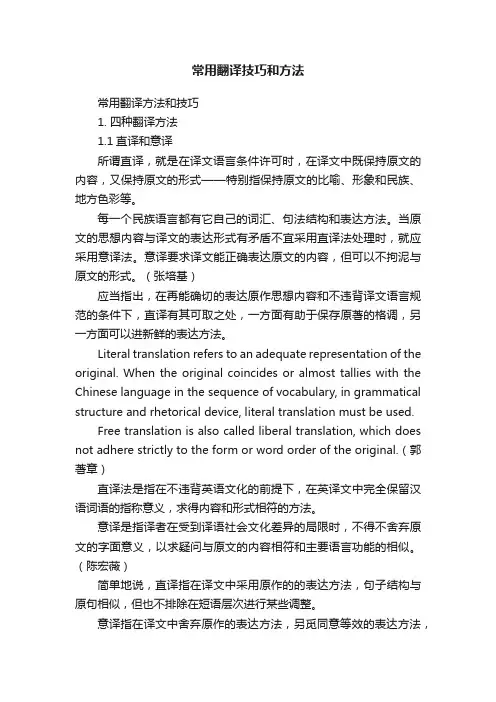
常用翻译技巧和方法常用翻译方法和技巧1. 四种翻译方法1.1直译和意译所谓直译,就是在译文语言条件许可时,在译文中既保持原文的内容,又保持原文的形式——特别指保持原文的比喻、形象和民族、地方色彩等。
每一个民族语言都有它自己的词汇、句法结构和表达方法。
当原文的思想内容与译文的表达形式有矛盾不宜采用直译法处理时,就应采用意译法。
意译要求译文能正确表达原文的内容,但可以不拘泥与原文的形式。
(张培基)应当指出,在再能确切的表达原作思想内容和不违背译文语言规范的条件下,直译有其可取之处,一方面有助于保存原著的格调,另一方面可以进新鲜的表达方法。
Literal translation refers to an adequate representation of the original. When the original coincides or almost tallies with the Chinese language in the sequence of vocabulary, in grammatical structure and rhetorical device, literal translation must be used.Free translation is also called liberal translation, which does not adhere strictly to the form or word order of the original.(郭著章)直译法是指在不违背英语文化的前提下,在英译文中完全保留汉语词语的指称意义,求得内容和形式相符的方法。
意译是指译者在受到译语社会文化差异的局限时,不得不舍弃原文的字面意义,以求疑问与原文的内容相符和主要语言功能的相似。
(陈宏薇)简单地说,直译指在译文中采用原作的的表达方法,句子结构与原句相似,但也不排除在短语层次进行某些调整。
翻译技巧英语有哪些方面
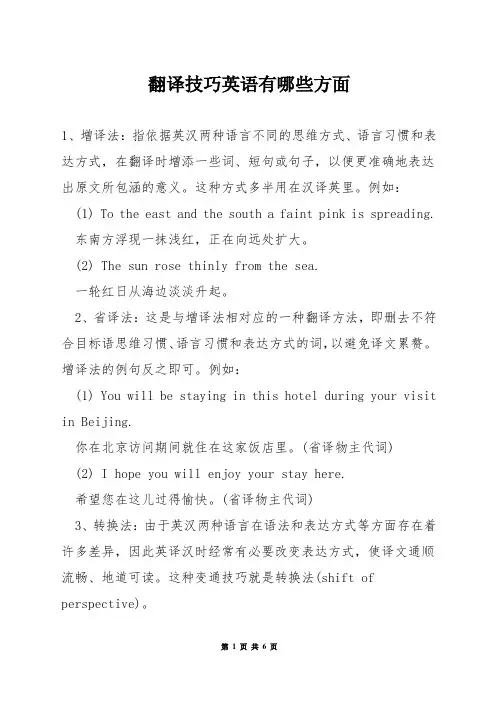
翻译技巧英语有哪些方面1、增译法:指依据英汉两种语言不同的思维方式、语言习惯和表达方式,在翻译时增添一些词、短句或句子,以便更准确地表达出原文所包涵的意义。
这种方式多半用在汉译英里。
例如:(1) To the east and the south a faint pink is spreading.东南方浮现一抹浅红,正在向远处扩大。
(2) The sun rose thinly from the sea.一轮红日从海边淡淡升起。
2、省译法:这是与增译法相对应的一种翻译方法,即删去不符合目标语思维习惯、语言习惯和表达方式的词,以避免译文累赘。
增译法的例句反之即可。
例如:(1) You will be staying in this hotel during your visit in Beijing.你在北京访问期间就住在这家饭店里。
(省译物主代词)(2) I hope you will enjoy your stay here.希望您在这儿过得愉快。
(省译物主代词)3、转换法:由于英汉两种语言在语法和表达方式等方面存在着许多差异,因此英译汉时经常有必要改变表达方式,使译文通顺流畅、地道可读。
这种变通技巧就是转换法(shift of perspective)。
4、合并法:由于文化上的差异,英译汉时有时直译原文就会使译入语读者感到费解,甚至误解。
这时,就有必要借用汉语中意义相同或相近、且具有自己鲜亮文化色彩的表达法对原文加以归化。
归化翻译法常用于处理某些英语成语、典故、形象词语等一类文化色彩较浓的表达方式。
恰倒好处地归化可以使译文地道简洁、生动活泼,便于译入语读者理解和接受。
例如:as timid as a hare 胆小如鼠at a stones throw一箭之遥翻译技巧的掌握帮助我们更好融入世界,翻译为我们搭起了各国之间的桥梁,翻译也越来越引起人们的重视。
为了培养更多的翻译人才,中国外文局教育培训中心始终保持专业、革新、开放的理念,精心打造全国复合型国际化人才培养施行基地和全国跨语言跨文化培训服务综合平台,为中国走向世界架桥铺路,为实现"中国梦'努力奉献。
四种翻译方法,十种翻译技巧
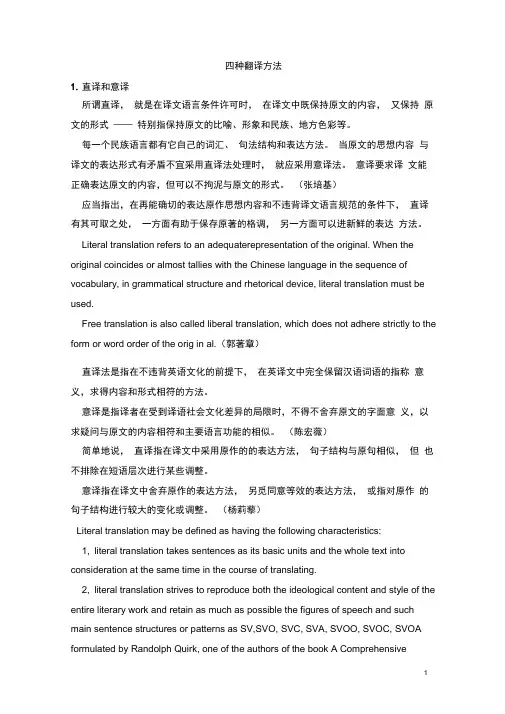
四种翻译方法1.直译和意译所谓直译,就是在译文语言条件许可时,在译文中既保持原文的内容,又保持原文的形式——特别指保持原文的比喻、形象和民族、地方色彩等。
每一个民族语言都有它自己的词汇、句法结构和表达方法。
当原文的思想内容与译文的表达形式有矛盾不宜采用直译法处理时,就应采用意译法。
意译要求译文能正确表达原文的内容,但可以不拘泥与原文的形式。
(张培基)应当指出,在再能确切的表达原作思想内容和不违背译文语言规范的条件下,直译有其可取之处,一方面有助于保存原著的格调,另一方面可以进新鲜的表达方法。
Literal translation refers to an adequaterepresentation of the original. When the original coincides or almost tallies with the Chinese language in the sequence of vocabulary, in grammatical structure and rhetorical device, literal translation must be used.Free translation is also called liberal translation, which does not adhere strictly to the form or word order of the orig in al.(郭著章)直译法是指在不违背英语文化的前提下,在英译文中完全保留汉语词语的指称意义,求得内容和形式相符的方法。
意译是指译者在受到译语社会文化差异的局限时,不得不舍弃原文的字面意义,以求疑问与原文的内容相符和主要语言功能的相似。
(陈宏薇)简单地说,直译指在译文中采用原作的的表达方法,句子结构与原句相似,但也不排除在短语层次进行某些调整。
意译指在译文中舍弃原作的表达方法,另觅同意等效的表达方法,或指对原作的句子结构进行较大的变化或调整。
英语 常用十大翻译技巧
英语常用十大翻译技巧常用十大翻译技巧之一:增译法增译法:指根据英汉两种语言不同的思维方式、语言习惯和表达方式,在翻译时增添一些词、短句或句子,以便更准确地表达出原文所包含的意义。
这种方式多半用在汉译英里。
汉语无主句较多,而英语句子一般都要有主语,所以在翻译汉语无主句的时候,除了少数可用英语无主句、被动语态或"There be…"结构来翻译以外,一般都要根据语境补出主语,使句子完整。
英汉两种语言在名词、代词、连词、介词和冠词的使用方法上也存在很大差别。
英语中代词使用频率较高,凡说到人的器官和归某人所有的或与某人有关的事物时,必须在前面加上物主代词。
因此,在汉译英时需要增补物主代词,而在英译汉时又需要根据情况适当地删减。
英语词与词、词组与词组以及句子与句子的逻辑关系一般用连词来表示,而汉语则往往通过上下文和语序来表示这种关系。
因此,在汉译英时常常需要增补连词。
英语句子离不开介词和冠词。
另外,在汉译英时还要注意增补一些原文中暗含而没有明言的词语和一些概括性、注释性的词语,以确保译文意思的完整。
总之,通过增译,一是保证译文语法结构的完整,二是保证译文意思的明确。
如:(1)What about calling him right away?马上给他打个电话,你觉得如何?(增译主语和谓语)(2)If only I could see the realization of the four modernizations.要是我能看到四个现代化实现该有多好啊!(增译主句)(3)Indeed, the reverse is true.实际情况恰好相反。
(增译名词)(4)就是法西斯国家本国的人民也被剥夺了人权。
Even the people in the fascist countries were stripped of their human rights.(增译物主代词)(5)只许州官放火,不许百姓点灯。
英文翻中文的八大翻译技巧
英文翻中文的八大翻译技巧英文翻中文的八大翻译技巧推荐首先是英文理解难,这是学习.使用英文的人的共同感觉,由于两国历史.文化.风俗习惯的不同,所以一句英文在英美人看来顺理成章,而在中国人看来却是颠颠倒倒.断断续续,极为别扭.二是中文表达难,英译汉有时为了要找到一个合适的对等词汇,往往被弄得头昏眼花,好像在脑子里摸一个急于要开箱子的钥匙,却没有.另外,英译汉时对掌握各种文化知识的要求很高,因为我们所翻译的文章,其内容可能涉及到极为广博的知识领域,而这些知识领域多半是我们不大熟悉的外国的事情,如果不具备相应的文化知识难免不出现一些翻译中的差错或笑话.正是因为英译汉时会遇到这么多的困难,所以,我们必须通过翻译实践,对英汉两种不同语言的特点加以对比.概况和总结,以找出一般的表达规律来,避免出现一些不该出现的翻译错误,而这些表达的规律就是我们所说的翻译技巧.一.词义的选择和引伸技巧英汉两种语言都有一词多类和一词多义的现象.一词多类就是指一个词往往属于几个词类,具有几个不同的意义;一词多义就是同一个词在同一词类中又往往有几个不同的词义.在英译汉的过程中,我们在弄清原句结构后,就要善于运用选择和确定原句中关键词词义的技巧,以使所译语句自然流畅,完全符合汉语习惯的说法;选择确定词义通常可以从两方面着手:1.根据词在句中的词类来选择和确定词义They are as like as two peas .他们相似极了. (形容词)He likes mathematics more than physics .他喜欢数学甚于喜欢物理. (动词)Wheat, oat, and the like are cereals .小麦.燕麦等等皆系谷类. (名词) 2.根据上下文联系以及词在句中的搭配关系来选择和确定词义.He is the last man to come .他是最后来的.He is the last person for such a job .他最不配干这个工作.He should be the last man to blame.怎么也不该怪他.This is the last place where I e_pected to meet you .我怎么也没料到会在这个地方见到你.词义引伸是我们英译汉时常用的技巧之一.翻译时,有时会遇到某些词在英语辞典上找不到适当的词义,如果任意硬套或逐词死译,就会使译文生硬晦涩,不能确切表达原意,甚至会造成误解.这时就应根据上下文和逻辑关系,从该词的根本含义出发,进一步加以引伸,引伸时,往往可以从三个方面来加以考虑.1.词义转译.当我们遇到一些无法直译或不宜直译的词或词组时,应根据上下文和逻辑关系,引伸转译.The energy of the sun comes to the earth mainly as light and heat.太阳能主要以光和热的形式传到地球.2.词义具体化.根据汉语的表达习惯,把原文中某些词义较笼统的词引伸为词义较具体的词.The last stage went higher and took the Apollo into orbit round theearth.最后一级火箭升得更高,把〝阿波罗号〞送进围绕地球运行的轨道.3.词义抽象化.根据汉语的表达习惯,把原文中某些词义较具体的词引伸为词义较抽象的词,或把词义较形象的词引伸为词义较一般的词.Every life has its roses and thorns .每个人的生活都有甜有苦.二.词类转译技巧在英译汉过程中,有些句子可以逐词对译,有些句子则由于英汉两种语言的表达方式不同,就不能逐词对译,只能将词类进行转译之后,方可使译文显得通顺.自然;对词类转译技巧的运用须从四个方面加以注意.1.转译成动词.英语中的某些名词.介词.副词,翻译时可转译成汉语中的动词. The lack of any special e_cretory system is e_plained in a similar way.植物没有专门的排泄系统,可用同样的方式加以说明. (名词转译)As he ran out ,he forgot to have his shoes on .他跑出去时,忘记了穿鞋子.2.转译成名词.英语中的某些动词.形容词,翻译时可转换成汉语中的名词.The earth on which we live is shaped a ball.我们居住的地球,形状像一个大球. (动词转译)The tor did his best to cure the sick and the wounded .医生尽了最大的努力来治疗病号和伤员. (形容词转换)3.转译成形容词.英语中有些作表语或宾语的抽象名词,以及某些形容词派生的名词,往往可转译成汉语中的形容词.另外,当英语动词转译成汉语名词时,原来修饰该动词的副词也往往随之转译成汉语中的形容词.It is no use employing radar to detect objects in water.使用雷达探测水下目标是没有用的. (作表语的名词转译)The sun affects tremendously both the mind and body of a man .太阳对人的身体和精神都有极大的影响. (副词转译)4.转译成副词.英语中的某些名词.形容词,翻译时可转译成汉语中的副词.When he catches a glimpse of a potential antagonist, his instinct is to winhim over with charm and humor .只要一发现有可能反对他的人,他就本能地要用他的魅力和风趣将这些人争取过来. (名词转译)三.汉译的增词技巧英译汉时,按意义上.修辞上或句法上的需要加一些词,使译文更加忠实通顺地表达原文的思想内容;但是,增加的并不是无中生有,而是要增加原文中虽无其词却有其意的一些词,这是英译汉中常用的的技巧之一.增词技巧一般分作两种情况.1.根据意义上或修辞上的需要,可增加下列七类词.Flowers bloom all over the yard .朵朵鲜花满院盛开. (增加表示名词复数的词)After the banquets ,the concerts and the table tennis e_hibitor ,he wenthome tiredly .在参加宴会.出席音乐会.观看乒乓球表演之后,他疲倦地回到了家里. (增加动词)He sank down with his face in his hands .他两手蒙着脸,一屁股坐了下去. (增加副词)I had known two great social systems .那是以前,他就经历过两大社会制度. (增加表达时态的词)As for me ,I didn’t agree from the very beginning .我呢,从一开始就不赞成.(增加语气助词)The article summed up the new achievements made in electronic computers,artificial satellites and rockets .本文总结了电子计算机.人造卫星和火箭这三方面的新成就. (增加概括词)2.根据句法上的需要增补一此词汇.Reading makes a full man ;conference a ready man ;writing an e_act man.读书使人充实,讨论使人机智,写作使人准确.(增补原文句子中所省略的动词) All bodies on the earth are known to possess weight.大家都知道地球上的一切物质都肯有重量. (增补被动句中泛指性的词)四.正反.反正汉译技巧正反.反正汉译技巧是指翻译时突破原文的形式,采用变换语气的办法处理词句,把肯定的译成否定的,把否定的译成肯定的.运用这种技巧可以使译文更加合乎汉语规范或修辞要求,且不失原意.这种技巧可分五个方面加以陈述.1.肯定译否定The above facts insist on the following conclusions .上述事实使人们不能不得出以下结论.2.否定译肯定She won’t go away until you promise to help her .她要等你答应帮助以后才肯走.3.双否定译肯定There can be no sunshine without shadow有阳光就有阴影.但是,如果翻译时保留英语原来的〝否定之否定〞的形式并不影响中文的流畅时,则应保留的目的还可突出原文中婉转的语气.如He is not unequalto the duty .他并非不称职.4.正反移位I don’t think he will come .我认为他不会来了.5.译为部分否定Not all minerals come from mines .并非所有矿物都来自矿山.Both of the substances do not dissolve in water.不是两种物质都溶于水.五.汉译的重复技巧重复技巧是英译汉中的一种必不可少的翻译技巧.由于英译汉时往往需要重复原文中的某些词才能使译文表达明确具体;又由于英汉语言结构不同,重复的手段和作用也往往不尽相同,大致可分为三种.1.为了明确I had e_perienced o_ygen and /or engine trouble.我曾碰到过,不是氧气设备了故障,就是引擎出故障,或两者都出故障(重复名词)Under ordinary conditions of pressure ,water becomes ice at C and steamat100C.在常压下,水在摄氏零度时变成冰,在摄氏一百度时变成蒸汽. (重复动词)A locality has its own over-all interest ,a nation has another and theearth get another.一个地方有一个地方的全局,一个国家有一个国家的全局,一个地球有一个地球的全局(重复谓语部分)2.为了强调He wandered along the street ,thinking and thinking brooding andbrooding.他在街头游来荡去,想了又想,盘算了又盘算.3.为了生动While stars and nebulae look like specks or small patches of light . theyare really enormous bodies.星星和星云看起来只是斑点点,或者是小片的光,但它们确实是巨大的天体.六.倒译技巧英汉词句组成和排列的顺序千差万别,因此英译汉时作些调整,颠倒一下顺序,则是一种极为常见的翻译技巧,这种翻译技巧共分五种类型.1.复合句倒译技巧.复合句倒译可分为部分倒译和完全倒译两种技巧.This university 6 newly _established faculties ,namely .Electronic Computer,High Energy Physics ,Laser ,Geo-physics ,Remote Sensing, and GeneticEngineering.这所大学现在有电子计算机.高能物理.激光.地球.物理.遥感技术.遗传工程等六个新建的专业. (部分倒译)Many laws of nature actually e_ist in nature though they have not yet beendiscovered.虽然许多自然规律还没被发现,但是它们确实在自然界中存在. (完全倒译)2.被动句倒译的技巧.被动句倒译时,有时可将被动句倒译成主动句,有时可将状语倒译成主语.The structure of an atom can be accurately described though we cannot seeit.虽然我们看不见原子结构,但能准确地描述它. (被动句倒译成主动句)Table tennis is played all over China .中国到处都打乒乓球. (状语倒译成主语)3.以否定型副词或条件副词开头的句子的部分倒译技巧.能引起这种倒译的副词有no ,never ,hardly ,no longer . in noway ,not until ,not even ,only等.Never before have I read such an interesting book .我从来没有读过这样有趣的书.4.带有介词短语句子的部分倒译技巧These date will be of some value in our research work .这些资料对于我们的研究工作有些价值.5.习语的倒译技巧.习语的倒译可分为按照汉语的固定顺序倒译和从轻重上加以区分进行倒译以及逆时间顺序进行倒译三种技巧.For its last 600 miles the Yellow River flows eastwards through the flat ,fertile ,North China Plain ,which is densely populated.黄河最后的六百英里,向东流过平坦肥沃.人口密集的华北平原. (按照汉语的固定顺序倒译)Heal the wounded ,rescue the dying ,practice revolutionaryhumanitarianism.救死扶伤,实行革命的人道主义. (以轻重上区分进行倒译)We have to be quick of eye and deft of hand .我们必须眼疾手快. (逆时间顺序倒译)七.句子成份的转译技巧英汉两种语言,由于表达方式不尽相同,在具体英译汉时,有时往往需要转换一下句子成分,才能使译达到逻辑正确.通顺流畅.重点突出等目的.句子成分转译作为翻译的一种技巧,其内容和形式都比较丰富,运用范围也相当广泛,共包括五个方面的内容.1.主语转译技巧,可以将句子的主语转译成汉语中的定语.宾语.状语等.The wings are responsible for keeping the sir plane in the air.机翼的用途是使飞机在空中保持不坠. (转译成定语)To get all the stages off the ground ,a first big push is needed.为了使火箭各级全部离开地面,需要有一个巨大的第一次推力. (转译成宾语) Machinery has made the products of manufactories very much cheaper thanformerly.因为机械的缘故,工厂里出的产品比起以前来,价格便宜多了. (转译成状语)2.谓语转译技巧.可以将谓语转译成定语.Radar works in very much the same way as the flashlight.雷达的工作原理和手电筒极为相同.3.宾语转译技巧.可以将宾语转译成主语.Automatic lathes perform basically similar functions but apper in avaritety of forms.各种自动车床的作用基本相同,但形式不同4.定语转译技巧.定语可以转译成谓语和状语.Neutron has a mass slightly larger than that of proton.中子的质量略大于质子的质量. (转译成谓语)Scientists in that county are now supplied with necessarybooks ,epuipmentand assistant ,that will ensure success in their scientific research.现在已给该县科学家提供了必要的图书.仪器和助手,以保证科研工作的成功. (转译成状语)5.状语转译技巧.状语转译一般指的是状语从句的转译.它可分作把时间状语从句转译成条件状语从句,把地点状语从转译成条件状语从句和把原因状语从句转译成困果偏正复句中的主语等三种形式.These three colors ,red ,green ,and violet ,when combined ,produced white.红色.绿色和紫色这三种颜色如果合在一起就变成白色. (时间状语从句转译成条件状语从句)Where there is nothing in the path of beam of light ,nothing is seen.如果光束通道上没有东西,就什么也看不到. (地点状语从句转译成条件状语从句)Because he was convinced of the accuracy of this fact, he stuck to hisopinion.他深信这件事正确可靠,因此坚持已见. (原因状语从句转译成因果偏正复合句中的主句)八.分句.合句汉译技巧英译汉时,由于两种语言的句子结构大不相同而往往需要改变一下句子结构以适应于汉语的表达习惯.采用分句.合句进行翻译的作法正是为了达到这种目的而运用的一种重要技巧.所谓分句,就是指把原文的一个简单句译成两个或两个以上的句子;所谓合名,就是指把原文的两个或两个以上的简单句或一个复合句译成一个单句.运用这种分句.合句的汉译技巧可以使译文层次分明,更合乎于汉语的表达习惯.分句流译的技巧共分五种类型,合句汉译的技巧共分三种类型.先谈谈分句汉译技巧的五种类型.1.主语分句汉译技巧.A man spending twelve days on the moon would find ,on returning to theearth ,that a year had passed by already.一个人如果在月亮上度过了十二天,回到地球以后就会发现一年已经过去了.2.谓语分句汉译技巧.It goes without saying that o_ygen is the most active element in theatmosphere.不言而喻,氧气是大气中最活泼的元素.3.定语分句汉译技巧He managed to raise a crop of 200 miracle tomatoes that weighed up to twopounds each.他居然种出了二百个奇迹般的西红柿,每个重达两磅.4.状语分句汉译技巧Sunrays filtered in wherever they could ,driving out darkness and chokingthe shadows.阳光射入了它所能透过的地方,赶走了黑暗,驱散了幽影.5.同位语分句汉译技巧.Mary normally a timid girl ,argued heated with them about it.玛丽平常是个腼腆的姑娘,现在也热烈地和他们辩论起来._年翻译资格考试三级口译模拟题1. The average age of people in the countryside is increasing, while thatof the cities is falling. More old people stay in the countryside than youngpeople and the opposite is true in the cities.译文:农村人口的平均年龄正处于上升趋势,而在城市却正好相反.原因是在农村老年人要比年轻人多,城市正好相反.解析:本句难度适中,只需要按照句子的逻辑顺序将句子信息陈列出来即可.此外,本句无明显生词.2. One important reason for the move to cities has to do with quality oflife issues: comfort and convenience. For e_ample, most of us would like ourchildren to receive the better education, and cities often offer betterschools.译文:〝进城热〞与生活水平问题息息相关.人们向往城市舒适方便的生活.就像我们大部分人都想子女能够接收到更好的教育,而城市通常就有教育质量更好的学校.解析:在做本句翻译时需要注意在前半句适当地增译一些信息,如在comfort and convenience 处需要加上move to thecities的主语〝人们〞.后半句难度不大,直译即可.3. Most burglars are opportunist, looking for an easier break-in. So don’tmake things simply for them. Don’t advertise the fact that you are out or away,or be careless about security.译文:大部分的窃贼都是投机分子,他们会寻找最方便快捷的〝翻.墙入室〞的机会.所以不要给他们可乘之机.不要嚷嚷着让别人都知道你不在家,也不要太精选大意而忽略了安全问题.解析:本句句型不复杂,需要注意几个词语的译法,如opportunist本来是〝机会主义者〞,在这里用于形容burglars身上,需要相应地翻译成贬义词〝投机分子〞;此外,don’tmake things simply for them可以用成语〝可乘之机〞概括,这些需要同学平时多做翻译练习积累,在会在临考时马上反应出来.4. Researchers from the University of Copenhagen and the University ofIceland said ash particles from the early part of the volcanic eruption areespecially abrasive, posing a possible threat to aircraft engines.译文:来自哥本哈根大学和冰岛大学的研究者们表示早些时候火山爆发遗留的火山灰摩擦度非常高.这可能对飞机的引擎产生威胁.解析:本句句型简单,但生词较多,需要考生抓注意些重点词汇理解.如:volcanic eruption 是表示〝火山爆发〞, abrasive表示〝磨损的〞.考生在遇到不会的单词时也不用过于慌张,一般句子中包含大量专业词汇句意都比较简单,可凭上下文进行推测.5. Lack of sanitation leads to wide spread of contamination of drinkingwater. Recent statistics say water-associated infectious diseases claim up to3.2million lives each year, appro_imately 6 percent all death globally.译文:不注意环境卫生会导致饮用水大规模受污染.近期的数据显示与饮用水有关的可传染性疾病每年可导致320万人失去生命,这个数字接近每年全球死亡人数的6%.解析:本句的主题是高口中常考的环境问题,全句无复杂结构,考生需要保证数字听译的准确性.本句中有出现两处数字,要求考生掌握数字速记的方法.contamination :污染infectious :传染的,有传染性的appro_imately :大约_年翻译资格考试三级口译模拟题The term 〝American dream〞 is widely used today. But what e_actly does thisconcept mean? Where does the term come from? Has the meaning of the term changedover time? Questions like these can complicate a seemingly simple term and leadus to an even more important question: is the American dream a myth or a realitytoday?The term 〝American dream〞 began to be widely used in _67. The term wasused in a famous novel written by Horatio Alger. The novel, Ragged Dick, was a〝rags to riches〞 story about a little boy who was orphaned and lived in NewYork. The boy saved all his pennies, worked very hard, and eventually becamerich. The novel sent the message to the American public that anyone couldsucceed in America if they were honest, worked hard, and showed determination tosucceed. No matter what your background, no matter where you were from, nomatter if you had no money or no family, hard work and perseverance would alwayslead to success.Today, the message from Alger’s novel is still a prevalent one in thiscountry. It is still used to define the American dream. A very basic definitionof the American dream is that it is the hope of the American people to have abetter quality of life and a higher standard of living than their parents. Thiscan mean that each generation hopes for better jobs, or more financial security,or ownership of land or a home.However, new versions and variations of the American dream have surfacedsince Alger’s novel was published. For one thing, the basic definitionI stateda moment ago —the idea that Americans are always seeking to improve theirlifestyle — also suggests that each generation wants more than the previousgeneration had. Some people would argue that this ever-increasing desire toimprove the quality of one’s life may have started out on a smaller scale in thepast, but today has led to an out-of-control consumerism and materialism. Another more benign view of the American dream is that it is about thedesire to create opportunities for ourselves, usually through hard work.Ahallmark of the American dream, some would argue, is the classic〝self-starter,〞the person who starts out with very little in life—little money, few friends,few opportunities—and works hard to make his or her way in the world. A classice_ample of this type of American dreamer would be former president AbrahamLincoln, who was born in a log cabin, was largely self-educated, and yet workedhis way up in the world to eventually become a United States president. This view of the American dream has also been associated with immigrantsand their quests for a better life in a new country. Americans have long beenfascinated by immigrant stories, and many feel great pride about their ownfamilies who may have come from other countries, worked very hard, and created abetter life for future generations.The American dream has also, historically, been associated with westwarde_pansion in this country. Throughout most of the _00s, the notion of thefrontier—a vast e_panse of largely unclaimed land in the West—symbolized newopportunities and a fresh start to people. Many a dreamer set off for the Westin search of land, jobs, gold, or other opportunities, often with ne_t tonothing in his pocket. Unfortunately, this idea of new opportunities in the Westhad a negative side.The American West was not unpopulated; Native American Indians already lived there, along with other immigrant groups, and these people were oftendisplaced — or met with violence — if they interfered with the visions or ideasof westward-migrating Americans.A more recent interpretation of the American dream has to do with equality.Civil rights activists such as Dr. Martin Luther King Junior, used some of therhetoric associated with the American dream to urge people to work for equalopportunities for all Americans, not just some Americans. A harsh reality wasbecoming clear to some people, especially in the _60s and _70s: not everyone had the same opportunities. If people were denied jobs, education, or otheropportunities because of their race, ethnic background, or gender, was the American dream only a myth?英语翻译。
常用十大英汉互译翻译技巧
常用十大翻译技巧英汉两种语言在句法、词汇、修辞等方面均存在着很大的差异,因此在进行英汉互译时必然会遇到很多困难,需要有一定的翻译技巧作指导。
常用的翻译技巧有增译法、省译法、转换法、拆句法、合并法、正译法、反译法、倒置法、包孕法、插入法、重组法和综合法等。
1、增译法:指根据英汉两种语言不同的思维方式、语言习惯和表达方式,在翻译时增添一些词、短句或句子,以便更准确地表达出原文所包含的意义。
这种方式多半用在汉译英里。
汉语无主句较多,而英语句子一般都要有主语,所以在翻译汉语无主句的时候,除了少数可用英语无主句、被动语态或"There be?结构来翻译以外,一般都要根据语境补出主语,使句子完整。
英汉两种语言在名词、代词、连词、介词和冠词的使用方法上也存在很大差别。
英语中代词使用频率较高,凡说到人的器官和归某人所有的或与某人有关的事物时,必须在前面加上物主代词。
因此,在汉译英时需要增补物主代词,而在英译汉时又需要根据情况适当地删减。
英语词与词、词组与词组以及句子与句子的逻辑关系一般用连词来表示,而汉语则往往通过上下文和语序来表示这种关系。
因此,在汉译英时常常需要增补连词。
英语句子离不开介词和冠词。
另外,在汉译英时还要注意增补一些原文中暗含而没有明言的词语和一些概括性、注释性的词语,以确保译文意思的完整。
总之,通过增译,一是保证译文语法结构的完整,二是保证译文意思的明确。
如:(1)What about calling him right away? 马上给他打个电话,你觉得如何?(增译主语和谓语)(2)If only I could see the realization of the four modernizations.要是我能看到四个现代化实现该有多好啊!(增译主句)(3)Indeed, the reverse is true 实际情况恰好相反。
(增译名词)(4)就是法西斯国家本国的人民也被剥夺了人权。
翻译的八大常用技巧
作用与意义1. 重译法:为了明确、为了强调、为了生动2. 增译法:为了更忠实于原文的意思,而又更合乎译文的表达习惯3. 减译法:源语言与目标语言互换的时候增译法就成了减译法4. 词类转移法:语言之间表达习惯的差异迫使译文中词类发生改变,词序有时也随之变化5. 词序调整法:语言之间构成形式并非完全相同,做必不可少的词序改变6. 分译法:主要用于长句的翻译,有时存在于词语语义的分译7. 正反翻译法:由于语言的习惯差异---正话反说,反话正说8. 语态变换法:主要指英汉两种语言间的主动与被动语态的转换In the event of one of the contracting parties being attacked by Japan or any other state allied with it and thus being involved in a state of war, the other contracting party will immediate render military and other assistance with all means at its disposal.一旦缔约国的一方受到日本或者与日本同盟的任何国家之侵袭,因而处于战争状态时,缔约国的另一方即尽全力给与军事及其他援助。
We have to analyze and solve problems.我们要分析问题,解决问题。
A large family has its difficulties.大(家庭)有大(家庭)的难处。
Our old clothes and few sticks of furniture have been pawned or sold.这几件旧衣服和这些旧家具,当的当了,卖的卖了。
Lightly floats and drifts the boat, and gently flows and flaps my gown.舟遥遥以轻扬,风飘飘而吹衣。
- 1、下载文档前请自行甄别文档内容的完整性,平台不提供额外的编辑、内容补充、找答案等附加服务。
- 2、"仅部分预览"的文档,不可在线预览部分如存在完整性等问题,可反馈申请退款(可完整预览的文档不适用该条件!)。
- 3、如文档侵犯您的权益,请联系客服反馈,我们会尽快为您处理(人工客服工作时间:9:00-18:30)。
常用的翻译技巧1. 重复法(repetition)2. 增译法(amplification)3. 减译法(omission)4. 词类转移法(conversion)5. 词序调整法(inversion)6. 分译法(division)7. 正说反译, 反说正译法(negation)8. 语态变换法(the change of the voices)1. 重复法We have to analyze and solve problems. 我们要分析问题,解决问题。
Le t’s revise our safety and sanitary regulations. 我们来修改安全规则和卫生规则吧。
Gentlemen may cry, peace, peace --- but there is no peace. 先生们尽管可以高呼和平,和平!但是依然没有和平。
He had it all written out neatly. 他把它写得清清楚楚。
1. 这种人闹什么东西呢闹名誉,闹地位,闹出风头。
What are they after They are after name, after position, and they want to cut smart figure.2. 大(家庭)有大(家庭)的难处。
A large family has its difficulties.3. 天苍苍, 野茫茫, 风吹草低见牛羊。
The sky is blue, blue; And the steppe wide, wide; Over grass that the wind has battered low; Sheep and oxen roam.4. 寻寻觅觅, 冷冷清请, 凄凄惨惨戚戚; 乍暖还寒时侯, 最难将息。
(译文1)Seek, seek; search, search; Cold, cold; bare, bare; Grief, grief; cruel, cruel grief. Now warm, then like the autumn cold again, How hard to calm the heart! (译文2)I seek but seek in vain, I search and search again; I feel so sad, so drear, So lonely, without cheer. (许渊冲译)2. 增译法增词义增加虚词为多,也可酌量增加实词。
英译汉时经常增加的词有结构词、数量词、概念词、语气词等。
从增补的功能来看,可以分为结构增补、意义增补和修辞增补。
I am looking forward to the holidays. 我们等待假日的到来。
Much of our morality is customary. 我们大部分的道德观念都有习惯性。
Reading makes a full man; conference a ready man; and writing an exact man. 读书使人充实,讨论使人机智,笔记使人精确。
Histories make men wise; poets witty; the mathematics subtle; natural philosophy deep; moral grave; logic and rhetoric able to contend. 读史使人明智,读诗使人灵秀,数学使人周密,科学使人深刻,伦理使人庄重,逻辑修辞之学使人善辩。
1. 没有调查研究就没有发言权。
He who makes no investigation and study has no right to speak. (No investigation, no right to speak.)2. 子曰: “学而不思则罔, 思而不学则殆。
” Confucius said: “He who learns without thinking is lost. He who thinks without learning remains puzzled.”3. 虚心使人进步, 骄傲使人落后。
Modesty helps one to go forward, whereas conceit makes one lag behind.4. 交出翻译之前, 必须读几遍, 看看有没有要修改的地方. 这样你才能把工作做好。
Before handing in your translation, you have to read it over and over again and see if there is anything in it to be corrected or improved. Only thus can you do your work well.5. 只许州官放火, 不许百姓点灯。
The magistrate are free to burn down houses, while the common people are forbidden even to light lamps. (One man may steal a horse, while another may not look over the hedge.)6. 班门弄斧Showing off one’s proficiency with the axe before Lu Ban the master carpenter.7. 三个臭皮匠, 顶个诸葛亮。
Three cobblers with their wits combined equal Zhuge Liang the master mind.8. 留得青山在, 不怕没柴烧。
So long as green hills remain, there will never be a shortage of firewood.3. 减译法增译法的反面减译法是指原文中有些词在译文中不译出来, 因为译文中虽无其词而已有其意, 或者在译文中是不言而喻的; 减译法是删去一些可有可无的, 或者有了反而累赘或违背译文习惯表达法的词, 并不是把原文的某些思想内容删去。
省译和增补是相辅相成的两种翻译技巧。
省译和分为结构省译和精炼压缩。
所谓结构省译是由于英汉两种语言在句子结构上的差异造成的。
在英译汉时经常省略的词有代词、系词、介词、连词、冠词、先行词等。
作主语和定语的人称代词以及做定语的物主代词均可省译。
如果把结构省译看作是消极的省译手段,那么精炼压缩则是积极的省译手段,前者明显,后者隐晦。
The earth goes around the sun. 地球绕太阳转。
On Sundays we have no school. 礼拜天我们不上学。
If you write him, the response would be absolute silence and void. 你写信给他,总是石沉大海。
A wise man will not marry a woman who has attainments but no virtue. 聪明的人是不会娶有才无德的女子为妻的。
It isn’t rum for a woman to want her old husband back, for respectability, though for a man to want his old wife back – well, perhaps it is funny, rather! (一个)女人为了体面(的关系)而要(她的从)前(的那个丈)夫回来,这并不(是)奇怪(的事),虽然(一个)男人要(他从)前(的那个)妻(子)回来,也许是很有趣的事。
1. 我们要培养分析问题、解决问题的能力。
We must cultivate the ability to analyze and solve problems.2. 郭沫若同志曾说: “中国人历来是勇于探索、勇于创造、勇于革命的。
” Comrade Guo Moro once said: “The people of China have always been courageous enough to prob e into things, to make inventions and to make revolution.”3. 他们为国家做的事, 比我们所做的多得多。
They have done much more for the state than we have.4. 词类转换法英译汉时词类转换的核心是根据需要将具有动作性的名词转换为汉语的动词,或者将可表示概念的动词转换为汉语名词。
汉译英时则反其道而行之。
For students of composition, an awareness that rhetorical patterns differ from one culture to another can help them become more quickly proficient in a writing pattern that is not native to them. 学习写作的人若能意识到各种文化在修辞模式上的差别,则有助于他们迅速掌握对他们来说是外在的写作模式。
The music is a gas. 这音乐妙极了。
Saud was a frustrated man at that time. 沙特那时已受挫折。
Traditionally, there had always been good relations between them. 他们之间一直有着传统的友好关系。
This experiment is a great success. 这次实验是极为成功的。
1) 语言这个东西不是随便可以学好的, 非下苦功不可。
The mastery of language is not easy and requires painstaking effort. 2) 一定要少说空话,多做工作。
There must be less empty talk and more hard work.3. 徐悲鸿画马画得特别好。
Xu Beihong’s drawings (paintings) of horses are exceptionally good.4. 林则徐认为, 要成功地禁止鸦片买卖, 就得首先把鸦片焚毁。
